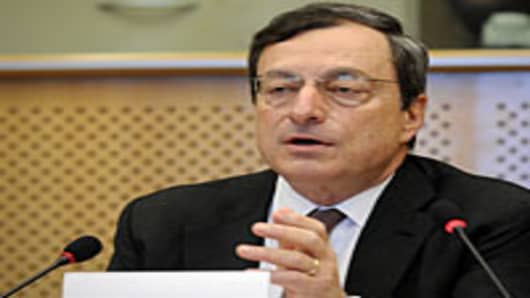New European Central Bank powers to oversee euro zone banks will help restore confidence in the sector and revive interbank lending, its president, Mario Draghi, said on Monday.
Ministers clinched a deal last week to give the ECB powers to supervise the currency bloc's banks from 2014, embarking on the first step in a new phase of integration to help underpin the euro.
Although the central bank will only have automatic oversight of around 150 of the bloc's 6,000-odd banks, it will have the authority to intervene in smaller banks if there are signs of trouble.
"The single supervisory mechanism will contribute to restoring confidence in the banking sector across the euro area. It will help revive interbank lending and cross-border credit flows, with tangible effects for the real economy,"
Draghi told the European Parliament's Economic and Monetary Affairs Committee. Bank-to-bank lending has never recovered from the onset of the global financial crisis in 2007 and many banks rely on the ECB for their liquidity needs while others hoard their cash rather than lend it on.
"Combined with possible direct recapitalization of banks by the European Stability Mechanism and an envisaged single resolution mechanism, the single supervisory mechanism will go a long way towards breaking the vicious feedback loops between sovereigns and banks," Draghi said.
Once ECB supervision is in place, the euro zone's rescue fund -- the European Stability Mechanism -- will be allowed in principle to recapitalize banks directly.
For now, euro zone governments have had to shore up their banks, adding further to public debt and creating a vicious circle between weak banks and states.
More profound mechanisms such as a resolution structure to wind up failing banks and a deposit guarantee fund are a long way from being implemented.
The ECB warned on Friday that there was no room for complacency following early signs of easing strain on financial markets.
Draghi also said the medium-term outlook for the euro zone economy remained "challenging".
At its last policy meeting earlier this month, the ECB forecast a bleak 2013 for the euro zone economy which it said would probably shrink again. It left the door open to a further reduction in interest rates -- already at a record low 0.75 percent -- in the early months of next year.


